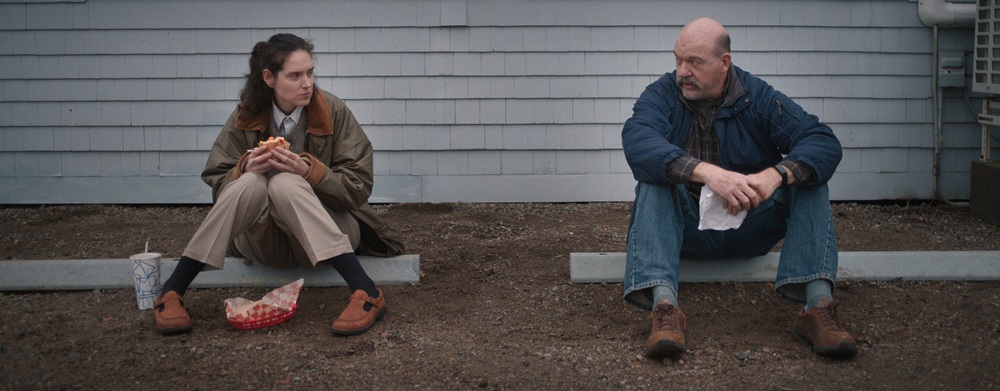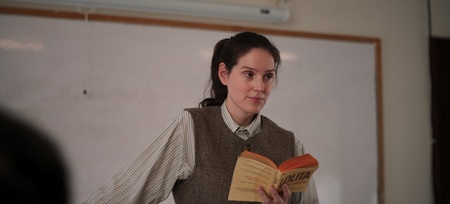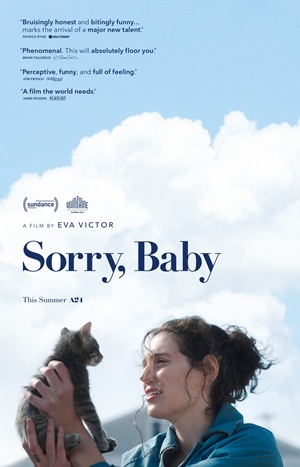
Sorry, Baby (2025)
by Sara Michelle Fetters - June 27th, 2025 - Film Festivals Four-Star Corner Movie Reviews
a SIFF 2025 review
Sorry, Baby Finds Catharsis in Friendship, Love, and the Healing Power of a Really Good Sandwich
There’s something about a good sandwich. Mediocre ones are a dime a dozen, mainly because this culinary standby is one of the first things we learn to make as children (peanut butter and jelly, anyone?). But there’s a comforting intimacy to one made with affection and concern. Maybe it’s because they have to be constructed entirely by hand. Meat? Veggies? Cheese? Condiments? Type of bread? Toasted? Untoasted? All of those questions must be answered — and how well they are is the key ingredient, as this shows just how well the person whipping it together knows the intended recipient and understands their needs in that precise moment.
Sorry, Baby understands the glories of a good sandwich, but that’s not the only thing it grasps. Director-writer-star Eva Victor values the importance of strong friendships. Their story finds comedy amid unspeakable trauma. It knows when to cry, when to get angry, when to be frustrated, when to laugh, and, most of all, when to let curative stillness defiantly speak for itself. I can’t stop thinking about this one.
Split into four distinct sections, the story picks up in the penultimate chapter, with former college roommates Agnes (Victor) and Lydie (a stellar Naomi Ackie) reuniting since the latter’s wedding a year prior. Agnes is on the verge of getting a permanent teaching position at their alma mater, a secluded New England university that always seems to be in the grip of an eternal winter. It’s the same job their former thesis advisor Preston Decker (Louis Cancelmi) once held. As for Lydie, she and her wife Fran (E.R. Fightmaster) are about to have a baby, so it’s good news all around.
Or is it?
This opening is key, as it immediately cements the unbreakable friendship between Agnes and Lydie. They can say or joke about things to one another no one else can. The two know when to be serious, be flippant, be playful, or let the unvarnished truth freely flow. These two have been through the wringer together. They have one another’s backs, no matter what. This is real love.
The reason this is so vital is that, as soon as this introductory segment concludes, Victor rewinds the story two years prior, when both women — along with a small group of classmates, including the needy and competitive Natasha (Kelly McCormack) — were in close consultation with Decker about their respective theses. While the professor tries to treat everyone equally, it’s clear he’s high on Agnes. She’s got something the others lack, and he’s eager to talk more about it with her one-on-one.
What happens next is hardly a surprise. What is shocking is the way Victor handles this moment. Agnes goes into Decker’s home with a smile, time passes, a pleasantly benign evening progresses into the cold black of night, and out she comes again — only now the look on her face is hardly comforting. In one eviscerating tracking shot, she walks the couple blocks back to the school parking lot and to her car in deafening silence.
We don’t need cue cards. We don’t need 60 seconds of pointless exposition explaining what has happened inside that house. It’s brutally clear. The shattering physical devolution of Victor’s performance coupled with the bleak intensity of cinematographer Mia Cioffi Henry’s handheld camerawork is all that’s required. This is as chilling a single moment as anything I’ve witnessed so far this year.
The third chapter focuses on Agnes’s life one year after the incident, while the fourth picks up the story sometime after the birth of Lydie and Fran’s baby. In each instance, Victor does a superb job of showcasing exactly where the young woman is in her process. There are times when she seems perfectly fine and others when the simplest of tasks sends her down a depressive rabbit hole of self-doubt, frustration, and unimaginable pain.
Through it all, the filmmaker triumphantly balances all of the emotional nuances inherent to this type of narrative. Victor has channeled a myriad of complex thoughts and dizzying sensations with compelling verisimilitude. At one moment we have Agnes pondering her own gender identity, a crooked smile crisscrossing her face as she subverts the simplistic checking of the M and F boxes on a jury duty form with a clever straight pencil line. Soon after, we see her valiantly try to keep from falling to pieces as she grapples with the realization that she needs to be excused from the case that’s about to be heard, as the subject matter hits far too close to home.
This all builds to a scene between Victor and veteran character actor John Carroll Lynch that I hesitate to talk too much about, as I don’t want to ruin the experience. Only know that this brief sequence hits like an anvil dropped from the heavens, but not in a bludgeoning or catastrophic way. Instead, it is empathetically shattering. A simple act of kindness and understanding saves a life that has been on a downward spiral far beyond that person’s control. A sandwich may also be involved.
There is so much more to analyze and discuss. Sorry, Baby is far from the first artistic endeavor to dive into trauma, abuse, bodily autonomy, and rape, but that does not make it any less inventive, original, or incisive. Victor’s story is undeniably personal, yet that does not make it any less insightful or universal. This is the type of film that stays with you long after the curtain has closed and everyone has left the theater. It’s darn near perfect.
Just like a good sandwich.
– Review reprinted courtesy of the SGN in Seattle
Film Rating: 4 (out of 4)







